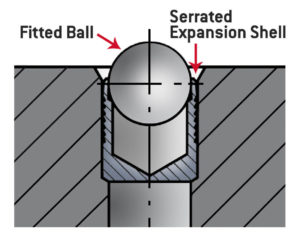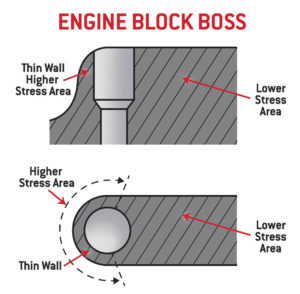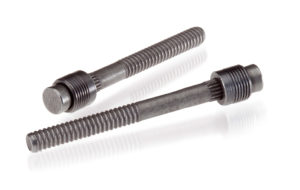LOW STRESS SEALING APPLICATIONS
AS ENGINE DESIGN EVOLVES TO MEET EMISSION AND PERFORMANCE REQUIREMENTS, THINNING PORT WALLS PRESENT SEALING CHALLENGES.
Today’s automotive engineers are challenged with designing more efficient engines that operate with reduced emissions. From small displacement, 4-cylinder engines in compact cars, to large displacement engines in commercial vehicles, new designs commonly reduce the size and weight of the engine to improve fuel consumption. Engine components are much closer together, and ports and passages – such as those that deliver oil – must be integrated into the remaining available space.

This results in thin port walls. Engineers are increasingly relying on low stress expander seals, such as the KOENIG EXPANDER®, in these applications.
“Customers that relied on cup plugs or threaded screws have realized these products are no longer appropriate,” noted Greg Kozlowski, Application Engineer at SFC KOENIG. “Thin port walls in new engine designs fail under the installation forces of these older style plugs, which have a wide part-to-part variation that can result in damage to one engine, and leakage in another.”
Thinner walls are increasingly common in crankshafts, cylinder heads, wrist pins, transmission systems and cast bosses located throughout the engine block. Often these ports are located in close proximity to bearings or moving parts. A seal that affects these surrounding components, due to expansion during installation or damage to the base, can cause additional wear. The precision tolerances of engineered seal solutions, like KOENIG EXPANDER plugs, are often looked to for reliable, precision sealing.

“Engineers often think of KOENIG EXPANDER seals for their high-pressure capabilities – up to 7200 psi working pressure,” continued Kozlowski. “Due to their precision engineering, we are increasingly providing expander plugs for what could be considered lower pressure applications – like an engine with operating pressure up to 65 psi, or even a crankshaft journal and bearing which can reach a few hundred psi – to provide safe and secure sealing with minimal effect to the port wall, even in applications with very thin walls and complex geometries.”
CUP & PORT PLUGS VS. KOENIG EXPANDERS
Commodity seals, such as cup plugs and port plugs are not produced with the same precision as a KOENIG EXPANDER. This repeatable precision of the KOENIG seal is maintained across millions of installations and can prevent cracking of the base or expansion of the port into nearby components, significantly reducing the risk of leaks, wear, and effects on system performance. SFC KOENIG also provides installation equipment for seal installation, with stroke force and distance strictly applied, providing additional controls.
Cup plugs typically utilize less precise forces in their installation, with larger variation in process performance. Similarly, the installation of threaded plugs applies torque to the base, which can result in cracks and deformation. These plugs typically require additional tapping or machining operations for their installation, as well as a sealant, all of which increases the potential for contamination.

In applications with thin walls, strict tolerances and reliable installation are critical. This becomes even more important when ports are located deep within the engine, where repair and review are difficult. SFC KOENIG also offers custom designed, low force expanders. For extremely sensitive applications where the standard expander does not solve the thin wall problem, this design reduces the installation stresses even further.
When compared to other standard sealing solutions, including less precisely-engineered expansion seals, KOENIG EXPANDER seals from SFC KOENIG have been proven to provide leak-proof security.
“With over 5 billion parts installed, and failure rates less than 1 PPM, our team understands the complex geometries and thin port walls in modern engine design,” continued Kozlowski. “Our can seal a wide variety of bore sizes, pressures, base materials and temperatures with complete reliability.”
For more on KOENIG EXPANDER solutions, view our Koenig Expander plug solutions.
single.php
